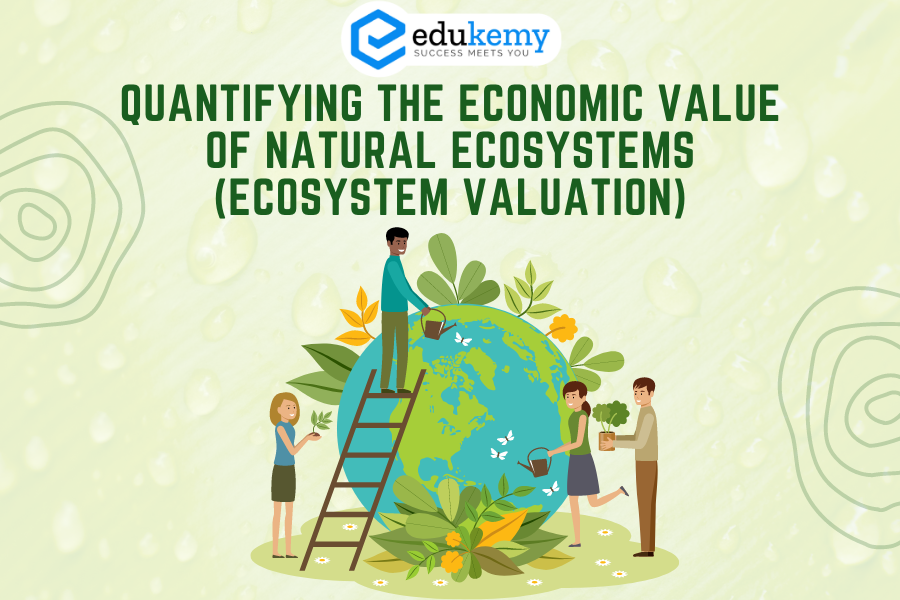- Human well-being and future economic and social development are intricately tied to the diverse offerings of both living (biotic) and non-living (abiotic) elements within an ecosystem.
- Ecosystems play a vital role in sustaining our long-term health and prosperity.
- Essential resources such as food, water, timber, air purification, soil formation, and pollination are just a few examples of the myriad benefits humans derive from ecosystems.
- The term “ecosystem services” encapsulates these fundamental services that are indispensable for life and the preservation of biodiversity on our planet.
Contents
- 1 Ecosystem Service Valuation: Assessing Nature’s Worth
- 2 FAQs – Ecosystem Goods, Services, and Valuation
- 2.1 1. Why are ecosystems crucial for human well-being and development?
- 2.2 2. What is meant by “ecosystem services”?
- 2.3 3. What are some examples of ecosystem goods and services?
- 2.4 4. How do ecosystems contribute to the provision of food and water?
- 2.5 5. What are “provisioning services” in ecosystems?
- 3 In case you still have your doubts, contact us on 9811333901.
ECOSYSTEM GOODS AND SERVICES
Ecosystem goods and services encompass the various benefits derived from the interaction of living organisms (plants, animals, microorganisms) and the environment (air, water, mineral soil) within Earth’s ecosystems.
Ecosystems contribute to humanity by providing a diverse array of goods and services:
Goods:
- Food
- Water
- Fuels
- Timber
Services
- Water Supply
- Air Purification
- Waste Recycling
- Soil Formation
- Pollination
- Regulatory Mechanisms
Ecosystem Services: Understanding Nature’s Contributions
Provisioning Services:
These services involve the tangible products and resources provided by ecosystems. Examples include:
- Food: Ecosystems supply various food items.
- Water: They play a crucial role in the provision and regulation of water resources.
- Medicines: Natural substances from ecosystems contribute to medicinal resources.
- Wood and Biofuels: Ecosystems yield materials for construction and energy.
Regulating Services:
Ecosystems function as natural regulators, maintaining ecological balance. Examples include:
- Air and Water Quality: Terrestrial ecosystems, like forests, filter and regulate air quality.
- Soil Erosion Prevention: Ecosystems prevent soil erosion, ensuring soil health.
- Greenhouse Gas Regulation: Natural processes regulate emissions, contributing to climate stability.
- Pest and Disease Control: Animals like birds, rodents, and frogs act as natural controllers.
Cultural Services:
Beyond practical benefits, ecosystems offer cultural and aesthetic values:
- Recreation and Tourism: Natural features, landscapes, and habitats attract tourism.
- Aesthetic and Spiritual Values: Some natural features are considered sacred and hold cultural significance.
Supporting Services:
These form the foundation for other services, supporting life on Earth:
- Habitat Provision: Ecosystems provide habitats for diverse life forms, preserving biodiversity.
- Nutrient Cycling: Essential for soil fertility and sustaining life cycles.
- Air and Water Purification: Natural processes detoxify and purify air and water.
- Climate Stabilization: Ecosystems moderate climate extremes and contribute to global climate stability.
- Genetic Resource Preservation: Critical for crop varieties, livestock breeds, medicines, and more.
Ecosystem Service Valuation: Assessing Nature’s Worth
Overview:
Evaluating the value of ecosystem services involves assessing their significance to people, often through economic processes. Economists gauge the value by determining how much individuals are willing to pay for the preservation or enhancement of these services.
Approaches to Valuation:
Monetary Valuation:
- Definition: Assigns a monetary value to ecosystem services.
- Purpose: Facilitates cost-benefit analyses for policy decisions.
- Example: Quantifying the economic benefits of a forest in reducing flooding or providing habitat for endangered species.
Biophysical Valuation:
- Definition: Evaluates the physical or biological importance of ecosystem services.
- Purpose: Provides insights into the ecological significance.
- Example: Assessing the role of wetlands in water purification.
Other Economic Processes:
- Definition: Various methods beyond direct monetary valuation.
- Purpose: Offers diverse perspectives on the value of ecosystems.
- Example: Considering the cultural or spiritual significance of natural landscapes.
Significance and Applications:
- Policy Guidance: Helps policymakers and conservationists make informed decisions.
- Cost-Benefit Analysis: Enables a comparison of policies based on human welfare benefits.
- Quantification: Provides a tool to measure the impact of management strategies.
Challenges:
- Quantitative Uncertainty: Valuations involve estimating non-market costs and benefits, leading to inherent uncertainty.
- Philosophical Dispute: Differences in perspectives on how to appraise the diverse values associated with ecosystems.
Ecosystem service valuation, while providing valuable insights, requires a nuanced understanding of the complex interplay between nature, human well-being, and the inherent challenges of assigning value to the diverse benefits ecosystems offer.
FAQs – Ecosystem Goods, Services, and Valuation
1. Why are ecosystems crucial for human well-being and development?
A: Ecosystems provide essential resources like food, water, timber, and contribute to air purification, soil formation, and pollination. Their services are foundational for long-term health and prosperity.
2. What is meant by “ecosystem services”?
A: Ecosystem services encompass the fundamental benefits humans derive from living (biotic) and non-living (abiotic) components within Earth’s ecosystems, crucial for sustaining life and biodiversity.
3. What are some examples of ecosystem goods and services?
A: Goods include food, water, fuels, and timber. Services encompass water supply, air purification, waste recycling, soil formation, pollination, and regulatory mechanisms in nature.
4. How do ecosystems contribute to the provision of food and water?
A: Ecosystems supply a variety of food items and play a vital role in the provision and regulation of water resources, contributing to the availability of these essential elements.
5. What are “provisioning services” in ecosystems?
A: Provisioning services involve tangible products and resources provided by ecosystems, such as food, water, medicines, wood, and biofuels.
In case you still have your doubts, contact us on 9811333901.
For UPSC Prelims Resources, Click here
For Daily Updates and Study Material:
Join our Telegram Channel – Edukemy for IAS
- 1. Learn through Videos – here
- 2. Be Exam Ready by Practicing Daily MCQs – here
- 3. Daily Newsletter – Get all your Current Affairs Covered – here
- 4. Mains Answer Writing Practice – here

